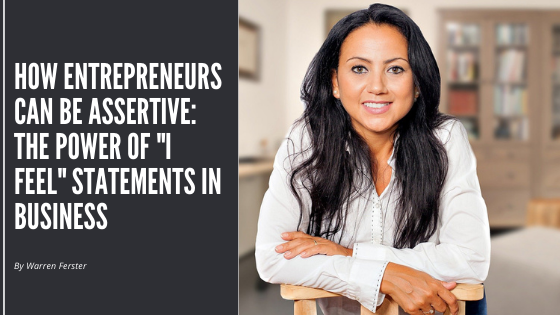Strong personalities can struggle to make their voices heard in the fast-paced, all-or-nothing world of business. In particular, entrepreneurs who tend to be introverted might find speaking out and being assertive to be a stressful experience. Fortunately, there are ways for entrepreneurs to be assertive while avoiding conflict with fellow professionals and clients alike. Here are just a few reasons why using “I feel” statements can change how you look at interpersonal communication in the workplace and beyond.
The Power of Words
For the most part, people tend to avoid being assertive in social situations because they fear the idea of either displeasing other people or creating an argument. Unfortunately, this mindset can quickly become a self-fulfilling prophecy; when we bury our true feelings for long periods, we often grow irritable with the people around us. When we do finally express ourselves after we hit our emotional limit, our emotions can haphazardly tumble out in a rush of accusations and self-pity.
That kind of communication does little to make situations better; it may even give us a reputation as someone difficult to communicate with. It’s much wiser to approach difficult situations with “I feel” statements.
Using “I Feel” Statements
“I feel” statements are challenging for others to find hostile because they simply summarize current emotions. Instead of blaming others, in other words, “I feel” statements describe how someone’s behavior makes us feel.
For example, suppose that a business partner isn’t keeping you in the loop about critical financial updates. This is a scenario that can definitely be frustrating. However, it may be hard to bring up concerns since it’s a lot less stressful to keep the peace in this critical business relationship. Rather than say anything, you may just keep your thoughts and emotions to yourself.
Over time, however, you’ll find that covering up emotions makes things even more stressful. You may chafe at any decision that your business partner makes without your input. You may even become passive-aggressive or rude.
Being Honest Without Being Offensive
In this scenario, it is far better, to be honest about the way you feel. But how can you do this without offending the other person? The key is using language that is designed not to hurt someone’s feelings. You might say, “When it seems like you don’t keep me up-to-date on important financial matters, I feel uninformed.”
Notice the words “it seems” and “uninformed” in this statement. When we tell someone what their behavior looks like to us, we avoid accusing them of that behavior. We are merely describing how we perceive their behavior. We’re also giving them a chance to explain their behavior in light of this new information.
Why “I Feel” Statements Work
Saying that you feel “uninformed” rather than “angry” lets you frame harsh or unpleasant emotions in a neutral and objective light. For example, most people will feel intimidated or ashamed when they are told that their behavior makes someone feel angry. Since most people tune out of a conversation once they feel guilty, we should avoid describing our emotions in ways that make other people “shut down.” In other words, the goal here is to inform people about your emotional state rather than to accuse them of something or to create feelings of shame.
In the business world, there can be little doubt that assertiveness is a necessary skill. But assertiveness does not have to be damaging to a relationship. By letting the people around us know when they’ve crossed a personal boundary, we’ll show them that our needs should be respected. In doing so, we’ll also demonstrate our respect for their needs. That is communication at its best!

